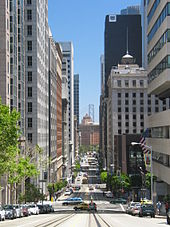
According to academic Rob Wilson, San Francisco is a global city, a status that pre-dated the city's popularity during the California Gold Rush.[160] Such cities are characterized by their ethnic clustering, network of international connectivity, and convergence of technological innovation. Global cities, such as San Francisco, are considered to be complex and require a high level of talent as well as large masses of low wage workers. A divide is created within the city of ethnic, typically lower-class neighborhoods, and expensive ones with newly developed buildings. This in turn creates a population of highly educated, white-collar individuals as well as blue-collar workers, many of whom are immigrants, and who both are drawn to the increasing number of opportunities available. Competition for these opportunities pushes growth and adaptation in world centers.
San Francisco has a diversified service economy, with employment spread across a wide range of professional services, including financial services, tourism, and (increasingly) high technology. In 2016, approximately 27% of workers were employed in professional business services; 14% in leisure and hospitality; 13% in government services; 12% in education and health care; 11% in trade, transportation, and utilities; and 8% in financial activities. In 2019, GDP in the five-county San Francisco metropolitan area grew 3.8% in real terms to $592 billion. Additionally, in 2019 the 14-county San Jose–San Francisco–Oakland combined statistical area had a GDP of $1.086 trillion, ranking 3rd among CSAs, and ahead of all but 16 countries. As of 2019, San Francisco County was the 7th highest-income county in the United States (among 3,142), with a per capita personal income of $139,405. Marin County, directly to the north over the Golden Gate Bridge, and San Mateo County, directly to the south on the Peninsula, were the 6th and 9th highest-income counties respectively.

The legacy of the California Gold Rush turned San Francisco into the principal banking and finance center of the West Coast in the early twentieth century. Montgomery Street in the Financial District became known as the "Wall Street of the West", home to the Federal Reserve Bank of San Francisco, the Wells Fargo corporate headquarters, and the site of the now-defunct Pacific Coast Stock Exchange. Bank of America, a pioneer in making banking services accessible to the middle class, was founded in San Francisco and in the 1960s, built the landmark modern skyscraper at 555 California Street for its corporate headquarters. Many large financial institutions, multinational banks, and venture capital firms are based in or have regional headquarters in the city. With over 30 international financial institutions, six Fortune 500 companies, and a large support infrastructure of professional services—including law, public relations, architecture and design—San Francisco is designated as an Alpha(-) World City. The 2017 Global Financial Centres Index ranked San Francisco as the sixth-most competitive financial center in the world.